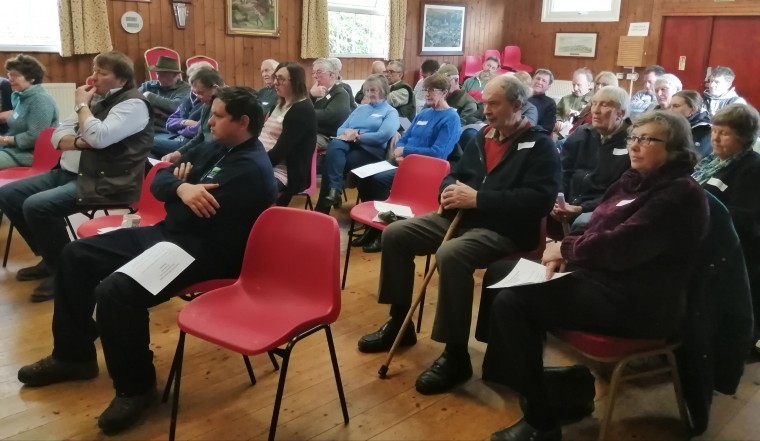Mr Peter Mummery stood among the audience in Alkham Village Hall on 20 February, to confront a representative of Defra about the increasing stress he and other farmers were under, in particular as a result of confusion over TB testing in the Dover area, which had left them unable to sell or move their cattle for 12 months.
The meeting was called by dairy farmer Di Smith, whose herd of 70 cows is confined to the farm under DEFRA regulations. She and her fellow farmers wanted answers from the government’s animal welfare vet Mr Leopold Ngoma Muanda, who agreed to debate the issue of radial testing and the regulations around TB prevention and spread.
Mr Ngoma outlined the circumstances of an incident in the Guston area last April, in which a cow showed an inconclusive test for TB and another in June, where an animal sent for slaughter was found with visible lesions. The farmer disputed the slaughterhouse test results several weeks later, but no DNA samples taken from the animal could be traced, so the imposition of three-kilometre radial testing around the farm was triggered. This has meant that no dairy cattle within that zone can be sent to market for 12 months.
Speaking on behalf of his fellow dairy farmers now suffering under the DEFRA TB restrictions, Mr Mummery told Mr Ngoma: “All of us here do everything we can to correctly produce food to the standards required, but the demands of bureaucracy are the main reason farmers are giving up. You are driving people out of business.
“It has nothing to do with the economics of farming. We understand that. Innocent people are being left to carry the can.”
His view was taken up by Rob Warnock, vice-chairman of the South East NFU Dairy Board who said the inconsistencies of the incident last year “smacked of complete incompetence” by the authorities. He added passionately: “We all want to stop TB spreading into Kent, but a dispute between the farmer involved in this case and DEFRA has now had an impact on everyone.”
“Everyone here is completely baffled how this has come about,” Mr Warnock said, claiming that DEFRA’s Animal and Plant Health Agency (APHA) had mishandled the issue, causing local farmers a great deal of anxiety and unexpected costs.
Mr Ngoma said if there were no TB controls farmers would not be able to trade within the EU under existing laws, or into the wider world, post-Brexit. TB tests were never 100% guaranteed, he said, but where there was doubt over results the three-kilometre radius restriction was imposed “to be better safe than sorry”.
DEFRA regulations required the declaration of one of three states following TB testing: First, that a herd was free of disease, second “suspended free status”, where there had been a suspected outbreak and third “free status withdrawn”, where TB was confirmed. The radial restriction on movement of cattle was imposed to prevent any spread of the disease where there was any doubt.
Mr Ngoma said Kent had a good record for being TB-free and the restrictions were being kept in place to ensure this continued. At the moment, the county tests for TB only every four years, unless there is an incident. He believed this would continue.
NFU area secretary Doug Jackson, who chaired the meeting, thanked everyone for attending and promised to take up the issues with DEFRA on their behalf.




